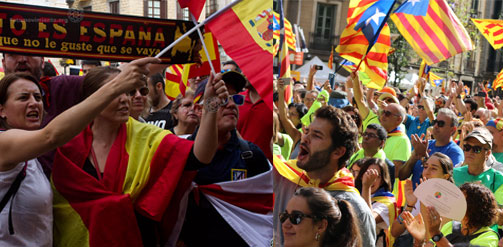Earlier this week, there was an excellent discussion at IDS on the role of evidence in a changing world with Claire Melamed, Michael Anderson, and Owen Barder, organised by the Centre for Development Impact. The premise was that those of us in the business of producing evidence for policy decisions have our jobs cut out for us in a ‘post-truth’ world, which now presents newer challenges and a growing audience that has little regard for ‘expert opinions’. But is post-truth just an old problem with a new name?

The discussion about the role of evidence (and experts) can be applied to debates around climate change, the impact of war, health statistics and treatments, the economic and social threat from immigrants, and a whole host of other things that people will happily hold beliefs about with little recourse to evidence which might back up those beliefs.
This is commonly described as a new ‘post-truth’ phase.
It got me thinking about two slightly separated but wholly related facts: firstly, is ‘post-truth’ really that new? And secondly, is what we are calling post-truth actually just a manifestation of a withering accountability relationship between states and their citizens?
Is post-truth a new phenomenon?
On the first, the fact that politicians can lie to their citizens – openly, callously, uncaringly – and get away with it may seem new in this moment to some parts of northern and central Europe and North America, but it is a very familiar fact to all those that inhabit the rest of the world.
Thinking of post-truth as new is both ahistorical and West-centric.
Facts have long been manufactured, manipulated and sold by people in and out of power across the globe and across time, not least in Europe and America (think of the propaganda campaigns during and in between the World Wars or during the Cold War).
People have gotten away with it because evidence is political, and truth is relative. In other words, facts speak to people’s experiences, to their view of the world, and to their interests. If erroneous facts are presented by those who cater to and further our individual or group interests, we have an incentive to believe them. It simply serves our purpose well.
This isn’t a new idea and we’ve heard lots about this in recent times:
- Some have called it motivated reasoning or the act of convincing ourselves of that which we want to believe.
- For others it is confirmation or cognitive bias, which leads us to facts that strengthen our existing beliefs and to reject others.
- Still others have pointed to the backfire effect that grounds us deeper in our own beliefs when confronted by facts that refute them.
- There is also the social desirability bias, which happens when we seek inclusion in a group through shared beliefs, such as when we share news that we know may not be entirely true or verified, but it shows group support and belonging, especially to political parties.
In other words, alternative facts become believable when they confirm our existing beliefs, and when countered with evidence that you may indeed have voted for the wrong person or issue, you simply dig in your heels further.
Weaker accountability relationship between states and citizens
What may be slightly newer is connecting an increasing tendency towards a post-truth world to a possibly weaker accountability relationship between states and citizens, politicians and voters.
So, what we get are situations in which unverified facts touted by politicians from the “Leave” campaign for the UK Brexit referendum, who claimed that leaving the EU would result in more funding being available for the NHS, go unpunished. No one appears to be holding the liars to account – they face no charges, and have actually moved on to positions of greater power.
Or like the situation in Alabama, where local Republican leaders are turning a blind eye to sexual harassment accusations against Senate hopeful Roy Moore, to the extent of saying that allegations of paedophilia would not stop them from supporting him in the Senate race. Brendan Nyhan of Dartmouth College, whose research leads prominently in this area, calls it ‘cognitive tribalism’. In her BBC article on Roy Moore, Kathy Kay simply describes it as tribalism.
In South Asia and Africa, we have known this tribalism in politics for a long time now.
When it concerns or affects the interest of their ethnic group, race, tribe, or caste, people are willing to look the other way when a politician from their “tribe” behaves badly or says things that may not be true.
In Latin America or in Europe, similar lines may be drawn on the basis of class or ideology. Party-based polarisation runs so deep in the Balkans, for example, that it renders most institutions ineffective, torn down the middle by partisan bias. Motivated reasoning and cognitive tribalism combines here, dangerously, with identity.
Psychologists believe that the tendency to do this increases with an increased sense of threat. In situations where people feel under threat, standing by your tribe becomes more important than a concern with hard facts and evidence.
Truth becomes ever more relative.
What is driving people further apart from one another?
So when we talk of a post-truth world, are we simply referring to a world in which we care far less about holding our leaders objectively to account, and far more about winning against the ‘other’?
In this world, accountability interventions then become simple witch hunts by the opposing group. In which case, the problem is polarisation, and the question we are left with is: what is the increased threat that is driving people, and electorates, further apart from one another?
An educated guess would be inequality, but what form does this now take? Could it be that a purer tribalism has indeed come to countries where the relationship between the state and citizens was generally more objective and robust? Income inequality is mixing and overlapping with other forms of identity — natives and older settlers versus newer immigrants; whites versus blacks; Sunni versus Shia; Catholic versus Protestants; Buddhists versus Muslims; and so on.
What I am suggesting is that the world is not suddenly losing its interest in or respect for evidence and expert opinion, but that people now find themselves facing odds in which facts take a backseat to narrow group interests, and holding lying leaders accountable for their actions is less important if it helps you show up the ‘others’. Why those odds are increasing, and why people feel more threatened now than before, is the question we need to be asking.
Image: After the 2017 Catalonia referendum, both pro-Union and pro-Independence supporters took to the streets of Barcelona. We chose this image not to suggest either party was lying to its publics (as per the discussion in the first half of this blog) but to illustrate the idea of people very visually identifying with particular political camps and identities. Credits: Fotomovimiento and Wikimedia.

